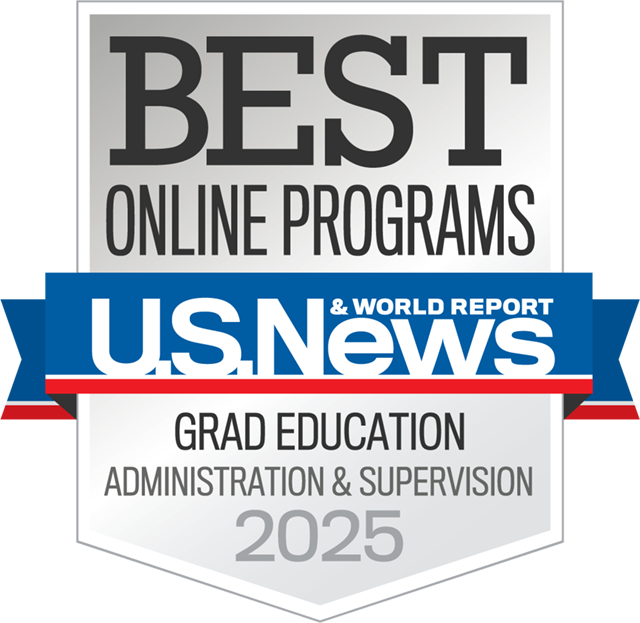Flexible Format
Complete most courses 100% online, with the option for an in-person internship.
Application deadline
Credits and costs
Nationally Recognized

Prepare for Your Role as an Education Leader
Inspire and encourage fellow teachers and students.
Expand your knowledge about schools, teachers, and student learning.
Integrate your teaching experience while honing your leadership skills.
Renew your passion to work on behalf of public education.
Course Work That’s Applicable to Your Career
Course Work That’s Applicable to Your Career
The course work in this program is designed to prepare you to be an outstanding leader who:
- is committed to continual improvement in education
- believes higher levels of learning are possible for all students
- supports the ideals of equity, inclusivity, and social justice
Relevant Course Work
Penn State's 30-credit online master of education degree in educational leadership emphasizes the knowledge and skills that you need as a teaching professional to achieve a supervisory role in your school. Each course in the program focuses on helping you to integrate your teaching experience while honing your leadership skills.
Once you are accepted into the program, you may begin your course work at the start of an academic semester. The typical student course load is expected to be three to four courses per year.
Collaborative Experience, Practical Applications
The master's degree curriculum uses a blend of web technology, print, and other media to maximize flexibility without sacrificing professor and student interaction.
Communication tools, including bulletin boards and email, are used to foster a collaborative environment, providing you with the opportunity to learn from one another. The curriculum and course format can help you develop practical applications of the topics you study. Learn online when it is convenient for you, and immediately apply what you've learned to your job.
Teacher Leader Emphasis
Course work in the teacher leader emphasis for the master’s program in educational leadership provides for core knowledge and skills to be explored through five required courses (15 credits) and for individualized program study to be explored through five elective courses (15 credits).
Teacher Leader Required Courses (15 credits)
- 3credits
This course focuses on understanding teacher leadership and its function with the school system.
- 3credits
This course focuses on understanding schools as learning organizations and how teacher leadership works in such organizations.
- 3credits
Focuses on several general models developed for school improvement purposes.
- 3credits
Provides aspiring leaders with learning opportunities and activities authentic to school leaders and leadership roles in educational organizations.
- 3credits
Completion and public presentation of an inquiry project reflecting an understanding of the five leadership strands. Taken in the final semester of the program.
Teacher Leader Electives (15 credits)
Selected by the student with support from their program adviser.
- Two EDLDR electives (6 total credits) at the 500- or 800-level
- One EDLDR elective (3 total credits) at the 500-level
- One open graduate elective (3 total credits) at the 500- or 800-level
- One open graduate elective (3 total credits) at the 500-level
School Leader Emphasis
School Leader Required Courses (30 credits)
The course work for the school leader emphasis is based on Pennsylvania standards and can help prepare you to become an effective school administrator. You will take specially designed courses along with a dedicated internship with a mentor from the field of education.
- 3credits
The analysis and use of the foundations which underlie models of curriculum design.
- 3credits
Development of educational leadership. Relationships among local, state, and federal agencies. Introduction to current concepts and theories.
- 3credits
This course serves as an exploration of the school leaders' role in promoting equity and diversity for all members of the school community.
- 3credits
Focuses on the development of skills related to data use that will help inform administrative and leadership decisions in school settings.
- 3credits
Focuses on several general models developed for school improvement purposes.
- 3credits
Provides aspiring leaders with learning opportunities and activities authentic to school leaders and leadership roles in educational organizations.
- 3credits
The principalship course provides students with knowledge specific to the role of the principal in K–12 schools.
- 3credits
This course gives students an overview of the values and policies shaping school finance in the United States, with a special emphasis on the relationship between education funding and equity.
- 3credits
Provides an overview of major issues in school law. The course will focus primarily on case law including U.S. Supreme Court decisions as well as relevant state and federal lower court opinions.
- 3credits
Required field experience across a calendar year for students in order to receive their principal certificate from the Pennsylvania Department of Education. Students earn 1 credit for each of 3 consecutive semesters for a total of 3 credits.
Course Availability
If you're ready to see when your courses will be offered, visit our public LionPATH course search (opens in new window) to start planning ahead.
Advance Your Career

Advance Your Career
You can use the knowledge gained from this program and the support of Penn State career resources to pursue careers in a variety of fields, depending on your goals.
Job Titles Related to This Degree
The following roles are often held by people with this type of degree:
- Education Coordinator
- Education Director
- Lead Teacher
- Principal
- School Administrator
- Student Services Director
Employment Outlook for Occupational Fields Related to This Degree
Estimates of employment growth and total employment are provided by the U.S. Bureau of Labor Statistics and are subject to change. While these occupations are often pursued by graduates with this degree, individual outcomes may vary depending on a variety of factors. Penn State World Campus cannot guarantee employment in a given occupation.
Education Administrators, Postsecondary
Education Administrators, Kindergarten through Secondary
Education and Childcare Administrators, Preschool and Daycare
Career Services to Set You Up for Success

From the day you're accepted as a student, you can access resources and tools provided by Penn State World Campus Career Services to further your career. These resources are beneficial whether you're searching for a job or advancing in an established career.
- Opportunities to connect with employers
- Career counselor/coach support
- Occupation and salary information
- Internships
- Graduate school resources
Ready to Learn More?
Get the resources you need to make informed decisions about your education. Request information on this program and other programs of interest by completing this form.
Ready to take the next step toward your Penn State master's degree?
Costs and Financial Aid
Costs and Financial Aid
Learn about this program's tuition, fees, scholarship opportunities, grants, payment options, and military benefits.
Costs and Financial Aid
Graduate Tuition
Graduate tuition is calculated based on the number of credits for which you register. Tuition is due shortly after each semester begins and rates are assessed every semester of enrollment.
2025–26 Academic Year Rates
| How many credits do you plan to take per semester? | Cost |
|---|---|
| 11 or fewer | $1,037 per credit |
| 12 or more | $12,448 per semester |
Financial Aid and Military Benefits
Some students may qualify for financial aid. Take the time to research financial aid, scholarships, and payment options as you prepare to apply. Federal financial aid may only be used to pay for credits used to satisfy program requirements.
Military service members, veterans, and their spouses or dependents should explore these potential military education benefits and financial aid opportunities, as well.
Additional Cost of Attendance Details
To view the detailed list of cost of attendance elements:
- visit the Tuition Information site
- click the plus sign to expand the table
- select a semester from the World Campus row
Technical Requirements
Review the technical requirements for this program.
Earn a Valuable Credential along the Way

Earn a Valuable Credential along the Way
The educational leadership curriculum is part of a larger portfolio of professional graduate degrees and certificates. Thanks to shared courses across programs, students can often earn a graduate certificate along with their master’s degree in less time than if they earned them separately.
Certificate Programs Related to This Degree
The following certificates can be earned while completing this degree program:
Earn the certification needed for educational administration and principal positions in Pennsylvania. This 18-credit online program meets the current requirements established by the National Council for Accreditation of Teacher Education and the Educational Leadership Constituent Council.
Learn more about the Graduate Certificate for PrincipalshipDevelop the professional knowledge, skills, and competencies required of candidates for Pennsylvania Department of Education Teacher Leaders Endorsement. Continue teaching in the classroom while you pursue additional roles such as lead teacher, mentor teacher, or department head.
Learn more about the Graduate Certificate in Teacher LeadershipCustomize Your Program
Quality educational leadership is vital to the overall success of an individual school or entire school system. As a strong academic leader, you can help orchestrate school reform, serve as a motivator to fellow teachers and students, and be key to high-performing schools.
Switching from one emphasis area to another is not permissible once you’ve been accepted into a specific program emphasis. Choose from three emphasis areas:
You can continue teaching in the classroom while you pursue alternative roles, such as a lead teacher, mentor teacher, or department head. In your course work, you will explore topics that include learning theory, teacher leadership, teacher inquiry, and curriculum design. Interested in Teacher Leader Endorsement in Pennsylvania?
Approved by the Pennsylvania Department of Education, the school leader emphasis meets Pennsylvania state educational requirements for school principal certification and offers an internship under the supervision of an approved on-site mentor principal. The internship allows you the opportunity to integrate the specialized knowledge learned through course work into the field and must span a full calendar year.
This emphasis area does not include the principal certification and is best aligned to students in international and private schools, domestic and abroad. The internship, which is the capstone assignment for the degree, is modified accordingly.
Benefit from an Internship
Benefit from an Internship
You'll have the chance to gain real-world experience thanks to an immersive internship experience.
Internship Requirements
If you are applying for the principalship certificate or the school leader emphasis of the Master of Education in Educational Leadership and you are interested in becoming a certified principal, please note that there are additional considerations regarding your internship.
Pennsylvania-Certified Educator
Your mentor needs to be a Pennsylvania-certified principal who has practiced in Pennsylvania as a principal (not an assistant principal) for at least 3 years.
Who Should Apply?
At this time, only Pennsylvania-certified educators are eligible to apply for the school leader emphasis of Master of Education in Educational Leadership. Our teacher leader and school leader (without principal certification) emphases are open to educators from other states and countries.
Act 48 Approved
Penn State is an Act 48–approved provider for Pennsylvania educators, so the courses for the Master of Education in Educational Leadership may count toward your professional development hours.
Set Your Own Pace

Set Your Own Pace
Whether you are looking to finish your program as quickly as possible or balance your studies with your busy life, Penn State World Campus can help you achieve your education goals. Many students take one or two courses per semester.
Our online courses typically follow a 12- to 15-week semester cycle, and there are three semesters per year (spring, summer, and fall). If you plan to take a heavy course load, you should expect your course work to be your primary focus and discuss your schedule with your academic adviser.
To Finish Your Degree in One to Two Years
- Take 3–4 courses each semester
To Finish Your Degree in Two to Three Years
- Take 2–3 courses each semester
To Finish Your Degree in Three to Four Years
- Take 1 course each semester
Timelines may vary based on course availability.
Convenient Online Format
This program's convenient online format gives you the flexibility you need to study around your busy schedule. You can skip the lengthy commute without sacrificing the quality of your education and prepare yourself for more rewarding career opportunities without leaving your home.
A Trusted Leader in Online Education

Penn State has a history of more than 100 years of distance education, and World Campus has been a leader in online learning for more than two decades. Our online learning environment offers the same quality education that our students experience on campus.
Professional Licensure / Certification
Disclosures
Many U.S. states and territories require professional licensure/certification for employment. If you plan to pursue employment in a licensed profession after completing this program, please visit the Professional Licensure/Certification Disclosures by State interactive map for more information.
How to Apply to Penn State

How to Apply to Penn State
Apply by November 1 to start January 12
Application Instructions
Deadlines and Important Dates
Complete your application and submit all required materials by the appropriate deadline. Your deadline will depend on the semester you plan to start your courses.
Spring Deadline
Apply by November 1 to start January 12Summer Deadline
Apply by March 15 to start May 18Fall Deadline
Apply by July 1, 2026, to start August 24, 2026
Steps to Apply
For admission to the J. Jeffrey and Ann Marie Fox Graduate School, an applicant must hold either (1) a baccalaureate degree from a regionally accredited U.S. institution or (2) a tertiary (postsecondary) degree that is deemed comparable to a four-year bachelor's degree from a regionally accredited U.S. institution. This degree must be from an officially recognized degree-granting institution in the country in which it operates.
GPA — A successful undergraduate record with a minimum GPA of 3.0.
Prior to submitting an application for the program, please be aware of the following:
- If you are considering applying to the School Leader emphasis, you will need to have a minimum of three years of school related experience by the time you start or complete the program.
- At this time, only Pennsylvania-certified educators are eligible to apply for the Graduate Certificate for Principalship and/or the School Leader emphasis of Master of Education in Educational Leadership. You must have the capacity to complete a required, (calendar) year-long internship with a qualified mentor principal (who has been a Pennsylvania principal for at least three years) for the School Leader emphasis.
- Our Master of Education in Educational Leadership program with the Teacher Leader emphasis is open to educators from other states and countries. Please note that switching from one emphasis area to another is not permissible once the student has been accepted into a specific program emphasis.
You will need to upload the following items as part of your application:
Official transcripts from each institution attended, regardless of the number of credits or semesters completed. Transcripts not in English must be accompanied by a certified translation. If you are a Penn State alum, you do not need to request transcripts for credits earned at Penn State but must list Penn State as part of your academic history.
Test Scores — No tests scores are required.
English Proficiency — The language of instruction at Penn State is English. With some exceptions, international applicants must take and submit scores for the Test of English as a Foreign Language (TOEFL) or International English Language Testing System (IELTS). Minimum test scores and exceptions are found in the English Proficiency section on the Fox Graduate School's "Requirements for Graduate Admission" page. Visit the TOEFL website for testing information. Penn State's institutional code is 2660.
References (3) — You will need to initiate the process through the online application by entering names, email addresses, and mailing addresses of three references. Upon submission of your application, an email will be sent to each reference requesting they complete a brief online recommendation regarding your commitment for success in an online program. Please inform all recommenders they must submit the form in order for your application to be complete.
Ask for letters from recommenders who can make a strong case for your commitment to success in an online program of graduate study. At least one of these recommenders should be your current school principal/supervisor. Remaining references should include individuals who have supervised you in an academic or professional setting, who can speak to your intellectual ability, communication and problem-solving skills, creativity, sensitivity to others, and educational leadership potential.
Ask for recommendations (completion of an online form and an attached recommendation letter) well in advance of the application deadline. Notify all recommenders that they must submit their recommendation in order for your application to be complete.
Program-Specific Questions/Materials
Statement of Purpose — Write a brief statement, of about 1000 words, describing your reason for applying for the Penn State World Campus Master of Education in Educational Leadership program and any experiences that have contributed to your commitment to education.
Résumé
Writing sample
- Select an article from a current education journal or peer reviewed journal, such as Education Policy/EPX (Sage), Educational Administration Quarterly (UCEA), International Journal of Educational Policy and Leadership (electronic journal), Educational Leadership (ASCD), or another similar option.
- Briefly summarize, in a maximum of three pages, the main points of the article and then critique the content from the vantage point of your experiences as an educator.
- Your critique can include agreement as well as disagreement with author's perspective.
- Include a complete citation for the article in your writing sample.
To begin the online application, you will need a Penn State account.
Create a New Penn State Account
If you have any problems during this process, contact an admissions counselor at [email protected].
Please note: Former Penn State students may not need to complete the admissions application or create a new Penn State account. Please visit our Returning Students page for instructions.
You can begin your online application at any time. Your progress within the online application system will be saved as you go, allowing you to return at any point as you gather additional information and required materials.
- Choose Enrollment Type: "Degree Admission"
- Choose "WORLD CAMPUS" as the campus
Checking Your Status
You can check the status of your application by using the same login information established for the online application form.Applying as a Nondegree Graduate Student
To begin taking courses right away, you may apply as a "nondegree" graduate student. You may take up to 6 credits in nondegree status before submitting your application portfolio. Only students matriculated into the educational leadership program as a student completing a degree or certificate program are permitted to take the EDLDR 595, Internship for Principals course.
Note: If you apply and enroll as a nondegree graduate student, you must re-apply to the degree/certificate program to be considered for admission into the Master of Education in Educational Leadership degree program. This new application includes a second application fee. Application/enrollment as a nondegree student does not guarantee admission to the program. Acceptance to the educational leadership degree program is contingent upon approved (by faculty panel) application to a selected program. If you plan to enroll as a nondegree student, you must contact an adviser in the program for guidance prior to beginning course work. No more than two courses (6 credits) are permitted in nondegree status before acceptance to the program is required.
In the graduate school application:
- Select "Nondegree Admission"
- Choose "WORLD CAMPUS" as the campus
5. Complete the application.
Admissions Help
If you have questions about the admissions process, contact an admissions counselor at [email protected].
Contact Us

Contact Us
Have questions or want more information? We're happy to talk.
To learn more about the Master of Education in Educational Leadership, fill out the form below.
For questions regarding the program and how to apply, please contact:
Mark Ivicic
Administrative Support Assistant
Educational Leadership Program
The Pennsylvania State University
Phone: 814-865-1487
Email: [email protected]
Learn from the Best
Learn from the Best
Offered by Penn State's College of Education and delivered online through Penn State World Campus, this program is taught by the same nationally recognized faculty who teach our rigorous, high-quality residential program.
Faculty
Gerald K. LeTendre
- DegreePh.D., Education, Stanford University
- DegreeM.S., Sociology, Stanford University
- DegreeB.A., Sociology, Harvard University
Dr. Gerald K. LeTendre is the Harry Lawrence Batschelet II Chair of Educational Administration at Penn State and co-editor of the American Journal of Education. His current research focuses on the impact of online learning and other information technologies on teacher-led professional development and teacher work roles. Dr. LeTendre has published on a broad range of topics in educational policy and comparative/international education. He is co-editor (with Motoko Akiba) of the International Handbook of Teacher Quality and Policy (Rutledge, 2017).
Tiffany M. Squires
- DegreePh.D., Instructional Design, Development, and Evaluation, Syracuse University
- DegreeM.S., Instructional Design, Development, and Evaluation, Syracuse University
- DegreeM.S., Education, Canisius College
- DegreeB.S., Elementary Education, State University of New York at Fredonia
Dr. Tiffany M. Squires is an assistant professor and serves as assistant director of Online Programs for Education Leadership. Dr. Squires has more than 15 years of experience in K–12 education as a teacher, principal, and professional development facilitator. Her dissertation research focused on the perceptions of principals regarding the role of the school leader in the implementation of curricular and instructional change associated with standards-based reform. Her research continues to focus on school systems reform/improvement and highly effective leadership practice.
News



